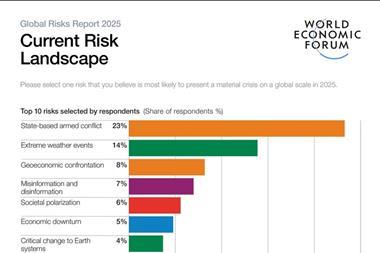Only 23% of boards are classified as highly resilient, according to research from EY. Here’s how they can step up and help manage the risks that threaten the organisations they serve
Six in ten board members believe emerging risks aren’t being sufficiently addressed in the organisations they serve, according to new research.
Nearly the same proportion say they aren’t aligned with other board members on the material risks that will significantly impact the organisation in the next 12 months.

The EY Global Board Risk Survey is a three-year benchmark survey revealing the views of 500 global board directors from organisations with revenues over US$1 billion.
Key findings include:
- Geopolitical events, supply chain disruption, and cyber-attacks/data breaches are the top three risks likely to have a severe impact on organisations during the next 12 months.
- Remote working and a misaligned culture are the two risks that have grown the most since the EY 2021 survey.
- Only 23% of boards are classified as highly resilient, where highly resilient boards are defined as being better at anticipating, preparing for and adapting to risks than their less resilient peers.
- 61% of respondents agree that enterprise resilience is more about adaptation than recovering back to normal.
- Only 31% of boards say their oversight of the risks arising from digital transformations is very effective, with education and upskilling highlighted as crucial actions for boards to balance tech adoption and risk exposure.
- 40% of board respondents say they don’t engage with C-suite executives more than twice a year.
An EY spokesperson said: ”To create long-term value, organisations need the trust of customers, employees, investors, community members, regulators and more. Resilience — the ability to anticipate, prepare for, respond and adapt to a changing environment — is a prerequisite for building that trust.
”As the overseers of risk, boards play a crucial role in helping to build the resilience within their organisations that engenders trust. It’s their role to support management in identifying changes in the business environment and to oversee how the organisation recognises and responds to the most material risks and opportunities.
”Boards need to support their organisations in anticipating and adapting to Gray Rhinos and other emerging risks, rather than reacting to them”
“As the findings of the EY Global Board Risk Survey show, boards face sharper challenges in navigating a risk environment that has become more expansive, complex and interconnected.
”In an increasingly complex risk environment that is likely to both persist and evolve, boards need to support their organisations in anticipating and adapting to Gray Rhinos and other emerging risks, rather than reacting to them.
“Boards also have an opportunity to add value by supporting management in horizon scanning and scenario planning to identify and capitalise on changes in the business environment before they become risks.”
Five strategies boards can adopt now:
By taking action in five key areas, boards can support their organisations in prioritising resilience, building trust and creating long-term value.
- Integrate risk management with strategy and performance management - 60% of boards agree that emerging risks are insufficiently addressed in risk management frameworks.
This suggests that the risks with the biggest increase in concern are also some of the most difficult to identify, track, and manage. Embedding risk into core strategic processes will be key to addressing the challenge. - Strengthen the board’s oversight of talent- and culture-related issues - 65% of boards agree on their remit to constructively challenge management on talent and culture issues.
Talent oversight is a core area for boards, but some of the newer people risks are outside of their traditional remit. More collaboration with, and a robust mandate for, the chief human resources officer (CHRO) will help. - Extend oversight over responses to sociopolitical issues - 66% of boards agree that addressing sociopolitical issues builds trust with employees and customers.
Boards are rightfully cautious about creating a potential backlash through political speech. A formal process for how to address sociopolitical issues could help prevent missed opportunities. - Oversee a shift to value-led sustainability - 66% of boards believe that enterprises can only be resilient if they are environmentally sustainable.
To drive impactful action and achieve value-led sustainability, boards need to engage various stakeholders to align on the organisation’s sustainability strategy and ambitions. - Understand the risk implications of digital and emerging technologies - 31% of boards say their oversight of the risks arising from digital transformations is very effective, while 19% say it’s slightly or less effective.
Education and upskilling will be crucial for boards to balance tech adoption and risk exposure in this ever-changing area — and to help their organizations to capitalise on the opportunities




















No comments yet